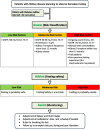Consensus recommendations on fasting during Ramadan for patients with kidney disease: review of available evidence and a call for action (RaK Initiative)
- PMID: 38448807
- PMCID: PMC10916266
- DOI: 10.1186/s12882-024-03516-y
Consensus recommendations on fasting during Ramadan for patients with kidney disease: review of available evidence and a call for action (RaK Initiative)
Abstract
Ramadan fasting (RF) involves abstaining from food and drink during daylight hours; it is obligatory for all healthy Muslims from the age of puberty. Although sick individuals are exempt from fasting, many will fast anyway. This article explores the impact of RF on individuals with kidney diseases through a comprehensive review of existing literature and consensus recommendations. This study was conducted by a multidisciplinary panel of experts.The recommendations aim to provide a structured approach to assess and manage fasting during Ramadan for patients with kidney diseases, empowering both healthcare providers and patients to make informed decisions while considering their unique circumstances.
Keywords: Chronic kidney disease; Dialysis; Ramadan fasting; Risk mitigation; Transplantation.
© 2024. The Author(s).
Conflict of interest statement
The authors declare no competing interests.
Figures

Similar articles
-
Diabetes and Ramadan: Practical guidelines 2021.Diabetes Res Clin Pract. 2022 Mar;185:109185. doi: 10.1016/j.diabres.2021.109185. Epub 2022 Jan 8. Diabetes Res Clin Pract. 2022. PMID: 35016991 Review.
-
Effects of fasting on patients with chronic kidney disease during Ramadan and practical guidance for healthcare professionals.Clin Kidney J. 2021 Feb 5;14(6):1524-1534. doi: 10.1093/ckj/sfab032. eCollection 2021 Jun. Clin Kidney J. 2021. PMID: 34079617 Free PMC article. Review.
-
Effects of fasting on solid organ transplant recipients during Ramadan - a practical guide for healthcare professionals.Clin Med (Lond). 2021 Sep;21(5):e492-e498. doi: 10.7861/clinmed.2021-0250. Clin Med (Lond). 2021. PMID: 34507933 Free PMC article. Review.
-
Fasting Ramadan in Chronic Kidney Disease (CKD), Kidney Transplant and Dialysis Patients: Review and Update.Cureus. 2022 May 24;14(5):e25269. doi: 10.7759/cureus.25269. eCollection 2022 May. Cureus. 2022. PMID: 35755525 Free PMC article. Review.
-
Patients with diabetes observing Ramadan: The experience of Muslims in the United States.Diabetes Res Clin Pract. 2019 Apr;150:282-287. doi: 10.1016/j.diabres.2018.12.011. Epub 2019 Jan 8. Diabetes Res Clin Pract. 2019. PMID: 30633934
Cited by
-
Short-term and long-term effects of Muslim fasting on lithium pharmacokinetics and renal function in bipolar disorder: a prospective observational study.Int J Bipolar Disord. 2025 May 14;13(1):17. doi: 10.1186/s40345-025-00378-7. Int J Bipolar Disord. 2025. PMID: 40366534 Free PMC article.
-
Predictors and health impacts of Ramadan intermittent fasting among patients with sickle cell disease.Front Med (Lausanne). 2025 May 29;12:1584795. doi: 10.3389/fmed.2025.1584795. eCollection 2025. Front Med (Lausanne). 2025. PMID: 40510850 Free PMC article.
References
-
- Dogan I, Eser B, Kayadibi H. The effect of Ramadan fasting on renal functions in patients with chronic kidney disease. Turk J Biochem. 2019;44(2):189–196. doi: 10.1515/tjb-2018-0373. - DOI
Publication types
MeSH terms
LinkOut - more resources
Full Text Sources
Medical
Miscellaneous

